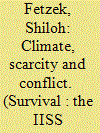| Srl | Item |
| 1 |
ID:
138603


|
|
|
|
|
| Summary/Abstract |
Soon after he took office in 2007, United Nations Secretary-General Ban Ki-moon declared that there was an urgent need to reframe the debate on climate change from an environmental to a development and security issue, and that it would be one of his top priorities as UN leader.
Environmental factors, including land use, water availability, biodiversity loss, soil degradation and acute weather events, have been implicated in at least 73 conflicts since 1980, and at least 40% of intra-state conflicts since the end of the Second World War can be associated with natural resources. A rapidly growing body of research on climate change, resource scarcity and conflict has ensured that the issue is rising on the international agenda. Yet, although such concerns cut across the security, development and humanitarian sectors, there is little dialogue, let alone coordination, between and among government departments and international and non-governmental organisations responsible for these domains.
|
|
|
|
|
|
|
|
|
|
|
|
|
|
|
|
| 2 |
ID:
141262


|
|
|
|
|
| Summary/Abstract |
The defining challenge of sustainable agriculture is the production of food and other agricultural products at an environmental cost that does not jeopardize the food security and general welfare of future generations. Feeding another three billion people in the face of climate change, biodiversity loss, and an environment already saturated with excess nitrogen and other reactive pollutants requires new approaches and new tools in the design and deployment of workable solutions. Solutions will be local but all will require an ecological systems approach that considers sustainable farming practices in the full context of ecosystems and landscapes. And their deployment will require an understanding of the social systems capable of building incentives that produce socially desired outcomes. Socioecological models for agriculture provide an opportunity to explore feedbacks, trade-offs, and synergies that can optimize and strengthen emerging connections between farming and society. With the right incentives, innovative research, and political will, a sustainable agriculture is within our reach.
|
|
|
|
|
|
|
|
|
|
|
|
|
|
|
|